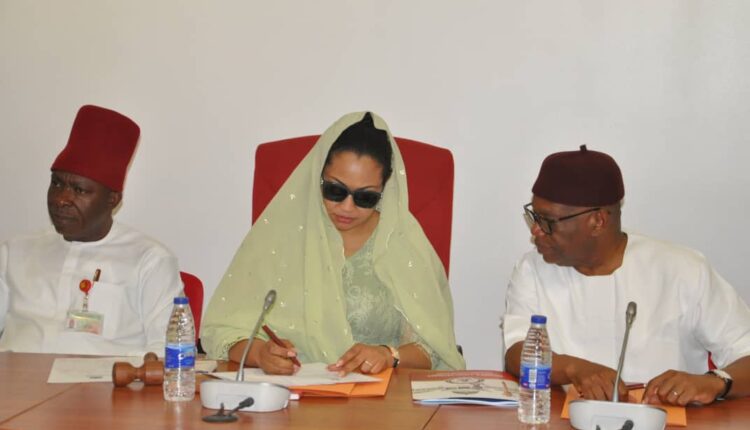Senator Natasha Proposes Comprehensive Plans to Tackle “Japa” Syndrome
Chairman of the newly inaugurated Senate Committee on Diaspora, Senator Natasha Akpoti-Uduaghan, has presented a strategic approach to mitigate the growing “Japa” syndrome—the mass migration of Nigerians seeking opportunities abroad. Addressing the committee at its first meeting, the senator emphasized that to reverse this trend, Nigeria must foster an environment where its citizens can thrive, reducing the need to seek greener pastures outside the country.

Akpoti-Uduaghan, who assumed leadership from outgoing Chairman Senator Victor Umeh, was joined by the committee’s Vice Chairman Anthony Harris and other key members. She highlighted the urgent necessity for comprehensive reforms to retain talent and harness the potential of Nigerians abroad for national growth.
In her speech, the senator acknowledged the complexity of the issue, noting that Nigeria cannot simply force citizens to stay. “The solution to the ‘Japa’ syndrome lies in offering opportunities for growth, security, and good governance. People will stay where they see hope and possibilities,” she stated, emphasizing that structural changes are essential for stemming the tide of migration.
To this end, she proposed a three-pronged approach to engage the diaspora and ensure that Nigerians abroad play an active role in national development:
Akpoti-Uduaghan suggested creating a dedicated bank to channel the billions of dollars Nigerians in the diaspora send home annually into structured, growth-driven projects.
This bank, managed by experts, she indicated would focus on sectors like healthcare, infrastructure, and technology, ensuring that diaspora remittances are invested in projects that foster long-term economic growth rather than immediate consumption. “We must turn the tide and make remittances a driver of sustainable economic development,” she said.

Drawing lessons from successful models in countries like India and Ethiopia, Akpoti-Uduaghan called for the creation of high-tech zones, manufacturing hubs, and textile industries where returning diaspora citizens can contribute their skills. She pointed to India’s dominance in the global ICT sector and Ethiopia’s thriving textile industry, which have both leveraged diaspora knowledge and investment to boost their economies. “Nigeria has the human capital and expertise in the diaspora; we must create industries where they can return and contribute,” she urged.
sive Nigerian Diaspora Database
The senator stressed the importance of building a detailed database of Nigerians abroad, enabling the government to identify and engage diaspora talent effectively. By collaborating with Nigerian embassies worldwide, Akpoti-Uduaghan proposed gathering data on citizens’ skills, professional expertise, and investment potential. “Data will allow us to track the diaspora’s impact, ensuring transparency in how their funds are used for national development,” she explained.
Additionally, Akpoti-Uduaghan outlined plans to organize a Nigeria Diaspora Business Summit. The summit according to her, would serve as a platform for Nigerian professionals living abroad to showcase their businesses, innovations, and investment opportunities, fostering closer ties between Nigeria and its diaspora.
Former Chairman Senator Victor Umeh praised Akpoti-Uduaghan for her visionary leadership, expressing confidence in her ability to lead the committee toward meaningful reform. “Her energy and insight into diaspora issues are exactly what we need to maximize the potential of Nigerians abroad for the development of our country,” Umeh stated.
With this strategic approach, Akpoti-Uduaghan aims to make Nigeria a more attractive place for both citizens at home and those abroad to invest, innovate, and contribute to national prosperity.

